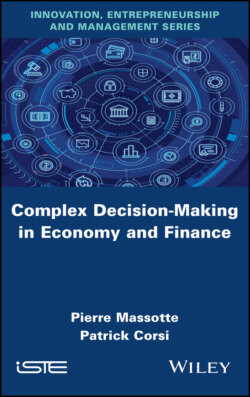Читать книгу Complex Decision-Making in Economy and Finance - Pierre Massotte - Страница 22
1.1.1. Reference definitions
ОглавлениеIn this chapter, we will refer to “system”, in Churchman’s sense [CHU 92], as any set of elements coordinated to achieve an objective. By “industry” we mean all economic activities that produce material goods or services through the transformation or implementation of added value on basic components or raw materials. Thus, a software development center, a production system, a manufacturing workshop, a travel agency, etc. are industrial systems. The study and analysis of a complex industrial system is based on its modeling.
Historically, we have first retained the quantitative aspect of the systems studied, then more recently, the qualitative aspect, for example through knowledge-based systems (KBS). The notion of complexity that we have just become aware of has been processed by the techniques of artificial intelligence, but the approach has remained based on the fact that we can mathematically formulate a problem using parameters, variables and algorithms. This “Galileo principle” assumes that the system is predictable and that there is no ambiguity; the state of a system at a given time is assumed to be able to determine its state at any subsequent time. It is therefore purely a matter of determinism. More precisely, we will call determinism the theory according to which causal laws govern all things in the universe.
Any event can then be considered as the effect of previous events and as the cause of subsequent events; the successive natural states then follow one another as if by necessity. Laplace [LAP 25], a strong supporter of Newtonian mechanics, formulated the theory of universal determinism, and this theory has been considered a “religious hypothesis” for a very long time. Thus, by knowing at a moment’s notice the position and speed of each particle in the sky, it is then possible to know the future of the universe. This assertion is theoretical because one cannot make predictions from a present state due to instabilities that amplify errors or minute variations in a system.
This deterministic approach always remained in force when physics underwent its second revolution with the publication of Albert Einstein’s theory on the “Theory of Special Relativity” in 1905. The “space-time” structure was then introduced, and it has shown that any event, in order to be described, must be related to a four-dimensional spatial-temporal continuum. The notion of space-time is then the only one that can be described as absolute. However, the intellectual approach remained the same.
These efforts in the search for truth have always favored the current followed by theorists, and more and more phenomena have been described, explained and interpreted. Advances have made it possible to achieve immense scientific progress and better control our environment. By applying such principles in specific areas of industrial engineering, such as planning or scheduling, we could say: “if we know the position, condition and manufacturing process of each product in a production system, it is then possible to precisely determine the situation and condition of that system in the future, as well as how it will evolve”. This obviously requires in-depth and rudimentary knowledge of technical data such as nomenclatures and ranges, a technical description and history of products and processes, etc.
However, considering multi-product and multi-process systems involving hundreds of operations and references, we cannot calculate or predict a specific event at a future time. The same is true for the dynamic behavior of this system: this is simply due to the application of the principles of uncertainty as defined by Heisenberg and to nonlinear amplification phenomena relating to the system under study. In addition, our scientific theories are more and more elaborate, and mathematical formulas and demonstrations are more and more complicated, in order to be able to identify the increasingly imperceptible, growing and hidden difficulties in phenomena.
On another level, the change in industrial needs nowadays imposes more stringent requirements to take into account technical (dismantling, reuse of components), social (customization of products), ecological and economic (pollution, energy savings) constraints. These constraints are grouped under the name NMPP (New Manufacturing Production Paradigm) and their consideration in future industrial management systems raises adaptation problems in terms of approaches, techniques and methods. The transformation of a discipline is attributed to the development of a new technique or the use of a new technique that has been ignored until now. In fact, it is never a question of developing a new technique: it is the nature of the results obtained that prevails and enables us, compared to other approaches, to implement or reveal new properties.
In the following, we will focus more specifically, after defining it, on the behavioral complexity of a system and explore the notion of deterministic chaos. Its nature is fractal and we will see how to exploit its properties in complex industrial systems.
